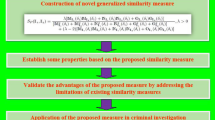Abstract
This paper shows how fuzzy formal concept analysis can be applied to a real crimes dataset in order to extract patterns and knowledge from it. Different concepts and attribute implications have been selected and interpreted obtaining interesting consequences.
Partially supported by the 2014–2020 ERDF Operational Programme in collaboration with the State Research Agency (AEI) in projects TIN2016-76653-P and PID2019-108991GB-I00, and with the Department of Economy, Knowledge, Business and University of the Regional Government of Andalusia. in project FEDER-UCA18-108612, and by the European Cooperation in Science & Technology (COST) Action CA17124.
Access this chapter
Tax calculation will be finalised at checkout
Purchases are for personal use only
Similar content being viewed by others
References
Antoni, L., Cornejo, M.E., Medina, J., Ramirez, E.: Attribute classification and reduct computation in multi-adjoint concept lattices. IEEE Trans. Fuzzy Syst. 1 (2020)
Antoni, L., Krajci, S., Kridlo, O., Macek, B., Pisková, L.: On heterogeneous formal contexts. Fuzzy Sets Syst. 234, 22–33 (2014)
Bělohlávek, R.: Fuzzy galois connections. Math. Log. Q. 45, 497–504 (1999)
Burusco, A., Fuentes-González, R.: Construction of the \({L}\)-fuzzy concept lattice. Fuzzy Sets Syst. 97(1), 109–114 (1998)
Cordero, P., Enciso, M., López, D., Mora, A.: A conversational recommender system for diagnosis using fuzzy rules. Expert. Syst. Appl. 154, 113449 (2020)
Cornejo, M.E., Medina, J., Ramírez-Poussa, E.: Attribute and size reduction mechanisms in multi-adjoint concept lattices. J. Comput. Appl. Math. 318, 388–402 (2017). (Computational and Mathematical Methods in Science and Engineering CMMSE-2015)
Cornejo, M.E., Medina, J., Ramírez-Poussa, E.: Characterizing reducts in multi-adjoint concept lattices. Inf. Sci. 422, 364–376 (2018)
Dilworth, R.P., Ward, M.: Residuated lattices. Trans. Am. Math. Soc. 45, 335–354 (1939)
Ganter, B., Wille, R.: Formal concept analysis: mathematical foundation. Springer Verlag (1999)
Konecny, J.: Attribute implications in L-concept analysis with positive and negative attributes: validity and properties of models. Int. J. Approx. Reason. 120, 203–215 (2020)
Medina, J., Ojeda-Aciego, M.: On multi-adjoint concept lattices based on heterogeneous conjunctors. Fuzzy Sets Syst. 208, 95–110 (2012)
Medina, J., Ojeda-Aciego, M., Ruiz-Calviño, J.: Formal concept analysis via multi-adjoint concept lattices. Fuzzy Sets Syst. 160(2), 130–144 (2009)
Author information
Authors and Affiliations
Corresponding author
Editor information
Editors and Affiliations
Rights and permissions
Copyright information
© 2022 The Author(s), under exclusive license to Springer Nature Switzerland AG
About this chapter
Cite this chapter
Aragón, R.G., Cornejo, M.E., Medina, J., Ramírez-Poussa, E., Rubio-Manzano, C. (2022). Formal Concept Analysis for Detecting Criminal Patterns. In: Harmati, I.Á., Kóczy, L.T., Medina, J., Ramírez-Poussa, E. (eds) Computational Intelligence and Mathematics for Tackling Complex Problems 3. Studies in Computational Intelligence, vol 959. Springer, Cham. https://doi.org/10.1007/978-3-030-74970-5_23
Download citation
DOI: https://doi.org/10.1007/978-3-030-74970-5_23
Published:
Publisher Name: Springer, Cham
Print ISBN: 978-3-030-74969-9
Online ISBN: 978-3-030-74970-5
eBook Packages: Intelligent Technologies and RoboticsIntelligent Technologies and Robotics (R0)




